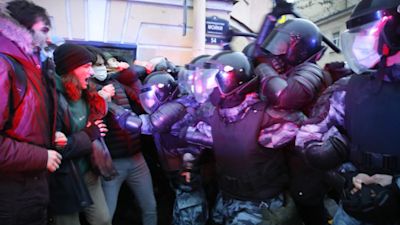Protest in Russia calling for Alexei Navalny to be freed as leader is in hospital after hunger strike

Video report by ITV News Correspondent Juliet Bremner
Thousands of protesters marched in central Moscow calling for Russian opposition leader Alexei Navalny to be freed, as he is reportedly in a "critical" condition after a hunger strike.
A total of 1,004 protesters were arrested across 82 cities in Russia, according to human rights group OVD-Info.
The leader's allies called for the demonstrations after reports over the weekend that its leader's health was in severe decline. The protests happened on the same day that Russian President Vladimir Putin gave his annual state-of-the-nation address.
Vladimir Ashurkov, executive director of Navalny's Foundation for Fighting Corruption, said: “The situation with Alexei is indeed critical, and so we moved up the day of the mass protests.
Alexei Navalny taken to hospital as fears grow for health of jailed Kremlin critic
Alexei Navalny’s doctor says the Putin critic ‘could die at any moment’
"Alexei’s health has sharply deteriorated, and he is in a rather critical condition. Doctors are saying that judging by his test (results), he should be admitted into intensive care.”
In Putin's speech, he denounced foreign governments' alleged attempts to impose their will on Russia. Although Putin did not use Navalny's name, Western governments have criticised Russia for its treatment of Navalny and have called for his release.
Navalny's group originally called for protesters to gather at Manezh Square, just outside the Kremlin walls, but police blocked it off.
So a large crowd gathered at the Russian Statement Library instead and people also lined Tverskaya Street - both of which were near the square. Both groups then marched through the streets.
“How can you not come out if a person is being murdered — and not just him. There are so many political prisoners,” said Nina Skvortsova, a Moscow protester.
Turnout estimates varied. Moscow police said 6,000 people protested in the capital, while an observer told Navalny’s YouTube channel that the crowd was about 60,000.
Navalny spokeswoman Kira Yarmysh and Lyubov Sobol, one of Navalny's most prominent associates, were arrested by police in the morning in Moscow.
Yarmysh has been charged with organising an illegal gathering.
Navalny, 44, was arrested in January upon his return from Germany, where he had spent five months recovering from a nerve agent poisoning he blames on the Russian government. Officials have denied the claim.
A court found Navalny’s long stay in Germany went against the terms of his suspended sentence, which he received in 2014 for embezzlement. He was jailed for two-and-a-half years.
The opposition leader began his hunger strike to protest prison officials’ refusal to let his doctors visit when he had severe back pain, and a loss of feeling in his legs. But the prison said Navalny was getting all the medical help he needed.
Navalny’s doctor Yaroslav Ashikhmin said test results showed a sharp rise in levels of potassium, which can bring on cardiac arrest, and heightened creatinine levels that indicate impaired kidneys and he “could die at any moment”.
On Sunday, Navalny was transferred to a hospital in another prison and given a glucose drip. Prison officials refused attempts by his doctors to visit him.
Russian authorities have been cracking down on Navalny’s supporters. The Moscow prosecutor’s office is asking a court to brand Navalny’s Foundation for Fighting Corruption as an extremist organisation.
Russian opposition leader Alexei Navalny has prison sentence appeal rejected
Russian opposition leader sentenced to three-and-a-half years in prison
Poisoned Kremlin critic Alexei Navalny jailed for 30 days after return to Russia